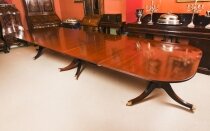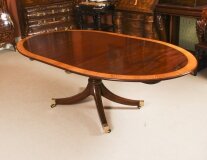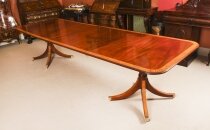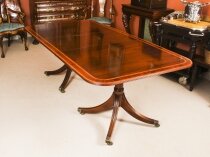Wylie & Lochhead
Glasgow, Scotland; furniture makers & retailers (fl.1829-1957)
Antique Furniture by the Scottish cabinet makers Wylie & Lochhead, means the piece is going to be of superb quality and a very high level of craftsmanship. They were famous for their stunning selection of wardrobes, dining chairs and dining tables.
In 1829 Wylie & Lochhead was started by cabinetmakers Robert Wylie and William Lochhead and they quickly became very successful with with a string of workshops, showrooms and warehouses in Glasgow employing over 1700 workers. By the 1900s they were a household name across Scotland, renowned for their artistic designs and high levels of craftsmanship.
Their most well known designers were E.A Taylor, John Ednie and George Logan. Their Arts & Crafts Furniture designs were considered of such high quality they were displayed at the Turin International Exhibition alongside those of Rennie Mackintosh and the Glasgow Four.
Wylie & Lochhead soon opened showrooms in England in London and Manchester, but they also began selling abroad in the United States.
Their antique furniture was so well crafted and beautifully finished that you still see many good examples for sale today.
Mahogany
is probably one of the largest ‘families’ of hardwood, having many different varieties within its own species.
Mahogany has been used for centuries in ship building, house building, furniture making etc and is the core structure of just about every 19th century vanity box, dressing case or jewellery box. It became more of a Victorian trend to dress mahogany with these decorative veneers, such as kingwood, burr walnut and coromandel, so tha,t the actual mahogany was almost hidden from view.
Mahogany itself is a rich reddish brown wood that can range from being plain in appearance to something that is so vibrant, figured and almost three dimensional in effect.
Although Mahogany was most often used in its solid form, it also provided some beautifully figured varieties of veneer like ‘Flame’ Mahogany and ‘Fiddleback’ Mahogany (named after its preferred use in the manufacture of fine musical instruments).
Cuban Mahogany was so sought after, that by the late 1850′s, this particular variety became all but extinct.
Winding Mechanism for extending tables
A man by the name of Samuel Hawkins applied for a patent on a screw expander on June 6th, 1861. Presumably, Mr. Hawkins either died or retired because his business was taken over by a young machinist named Joseph Fitter in 1864.
Joseph Fitter operated a machinist shop where he produced winding mechanisms for extending tables as well as screw expanders for piano stools and other applications at 210 Cheapside, Birmingham England by the name of Britannia Works.






































